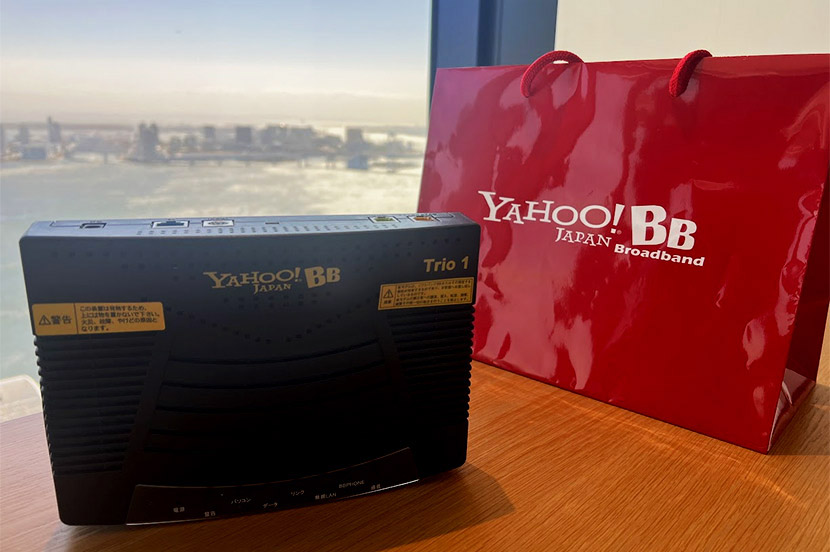
In 2001 the red shopping bags shown above were distributed in cities across Japan and became a common sight. Each bag held an ADSL modem, which made it possible for consumers to connect to high-speed Internet using their existing home telephone lines.
SoftBank Corp. (TOKYO: 9434) first entered the ADSL Internet connection business in 2001. Promising "overwhelmingly affordable prices," it pioneered the spread of ADSL broadband services and the development of Japan's Internet. SoftBank's ADSL service, called “Yahoo! BB ADSL,” drew to a close on March 31, 2024, marking an end to 22 years of service.
How ADSL brought the broadband revolution to Japan
ADSL, which stands for “Asymmetric Digital Subscriber Line,” is a technology that allows Internet connections to be made over copper telephone lines. It was first introduced in the early 1990s in the United States. Compared to ISDN (“Integrated Services Digital Network”), which was the main means of making Internet connections in Japan at the time, ADSL offered faster connections, fixed-rates, and always-on connectivity. As a result, ADSL adoption spread widely among households and small businesses across Japan in the 2000s.
Unlike the narrowband lines, which were primarily used for voice communication and could only provide limited data transmissions at low speeds with dial-up connections, ADSL used broadband lines that provided more bandwidth to enable faster data communication. The growing demand for broadband in Japan enticed many companies to enter the ADSL business. September 2001 marked the launch of SoftBank’s own comprehensive broadband service, Yahoo! BB ADSL.
Yahoo! BB grew to become Japan’s No. 1 broadband service within approximately two and a half years after launch, capturing over 35% of the ADSL market. Why was it so successful? One factor was the service’s overwhelmingly low prices for the time. While other companies provided their ADSL services for about 5,000 to 6,000 yen per month, Yahoo! BB came as a surprise to customers with its flat rate of 2,280 yen per month (excluding tax). Yahoo! BB was also marketed with unconventional sales tactics. Sales teams set up booths marked with red and white parasols on sidewalks and in front of large stores. The so-called "Parasol Troopers" gave away red shopping bags that contained the modems for ADSL connections nationwide.

Left: A photo of a Parasol Trooper distributing free modems, Right: A single modem
The rapid deployment of the service was also helped by service quality. Initially, Yahoo! BB utilized the international lines of SoftBank's group companies, offering ADSL speeds up to four times faster than other companies, with maximum download speeds of 8 Mbps and upload speeds of 900 Kbps, establishing one of the world's best Internet connectivity environments. Additionally, the service area expanded rapidly, enabling Internet connectivity anytime, anywhere.
The widespread adoption of ADSL made web browsing and email more convenient, enhanced entertainment experiences using video, music, and online games, and normalized real-time online communication worldwide to significantly transform people's lives in Japan.
Key Executive Reflects on the ADSL Journey
SoftBank, with its affordably priced and high-speed communication ADSL offering, contributed to the widespread adoption of broadband Internet in Japan. Reflecting on SoftBank’s ADSL journey, an executive who led the Yahoo! BB business at the time, shared his thoughts.

Hajime Baba
Baba participated in SoftBank’s ADSL business from the beginning in 2001. As a sales planning director, he led comprehensive training sessions for thousands of staff gathered at Makuhari Messe, a major exhibition hall on the outskirts of Tokyo, to quickly establish a sales structure from scratch and was responsible for developing sales strategies, including sales structures for electronics retailers. Baba is currently Executive Vice President, Corporate Officer, Co-COO at PayPay Corporation, a SoftBank Corp. group company.
Today, always-on connectivity, high-speed communication, and affordability in Japan's broadband services are taken for granted. It was Yahoo! BB ADSL that made this the norm. With the discontinuation of the ADSL service and reflecting on what it achieved, our mission feels profoundly significant.
Although we gave away modems in red shopping bags on the streets, we initially offered free modem rentals to use the “Yahoo! JAPAN” Internet portal, so there was a precedent. I got involved with ADSL in late 2001, driven by the desire to make ADSL well known and used by more people. We started distributing modems in electronics stores where people gather. Our salespeople would say, “Try it free for two months. You'll see the benefits.” We began streetside sales where there was a lot of foot traffic. I remember starting out in front of a coffee shop in the Ikebukuro shopping and entertainment district in Tokyo, setting up a makeshift table like those used at street stalls, even when it rained.


Street sales conducted in front of coffee shop in Ikebukuro
At that time, we were just trying out our sales tactics, so all of our posters were handwritten. We tested shopping bags in various colors like white and blue, but settled on red ones because they had the highest sales. It was eye-catching and had an appearance similar to the fun-filled “mystery bags” found at Japan’s department stores in the New Year sales season, I think.
While distributing modems was certainly crucial to our service expansion, having a high quality service was essential for widespread adoption. Unlike the ATM communication method commonly used at the time, we adopted the IP communication method, which is the global standard, and this allowed us to procure network equipment from around the world. This made our service more affordable and faster. We also created a network backbone in a ring shape. It's commonplace now, but the idea of connecting the entire country in a ring-like shape was novel at the time. Many engineers made this possible. I believe the rapid spread of our service in Japan was due to its high quality. The philosophy of “First, create a great service; then, marketing and promotion will follow” is still alive and well at my current position at PayPay.
I believe SoftBank became what it is today thanks to the support of our first Yahoo! BB ADSL customers and all of those who came to cherish the service. I want to say thank you to everyone who used it for such a long time.
Employees Also Reflect on 22 Years of History
SoftBank employees who helped drive the spread of the ADSL service also have many fond memories. Employees who were involved during the startup phase shared some anecdotes as follows.
- “Upon joining in January 2003, I was in charge of distributing modems at major stations across the country as a Parasol Trooper. Now that 20 years have passed, I feel a sense of sadness as the service has come to an end.” (Employee in 40s, Parasol Trooper)
- “Gathering 2,000 sales staff within two months for training and then deploying them across Japan was an invaluable experience that let me feel the speed and dynamism of starting a business. The experience is deeply ingrained in our company culture, and it made subsequent achievements, such as the mobile business acquisition, the exclusive launch of iPhones in Japan, and most recently, the launch of PayPay, possible.” (Employee in 50s, Sales)
Some employees encountered ADSL services during their student days or joined SoftBank because of their part-time work as Parasol Troopers. Many of these employees saw firsthand how ADSL changed people's lives on the streets across Japan.
- “My mother brought home a red shopping bag and bought a whole PC setup, which really surprised me.” (Employee in 40s, PR & Advertising)
- “I remember waiting over an hour to watch a 5 minute video using dial-up Internet during my student days. After switching to ADSL, I was amazed by the much faster speeds. Now, with speeds reaching 10GB, it's clear how times have changed.” (Customer in 30s)
- “I was a student at the time, working part-time to hand out Yahoo! BB modems outside restaurants and game arcades as a Parasol Trooper. I have memories of struggling to explain ADSL to elderly people and children who wanted the modem in the red bag. It was during this time that I learned the basics of the Internet and communications, and this eventually led to my joining SoftBank." (Employee in 40s, Parasol Trooper)
- “The biggest reward during the introduction phase was seeing how ADSL changed customers' lifestyles. I'll never forget their expressions of surprise and joy when they tried the service at our stores.” (Employee in 60s, Sales & Marketing)
- "I was involved in monitoring and maintaining the ADSL service upon entering the company. Initially, there were over 20 employees on the team, and we recently managed to fully transition the service from ADSL to optic fiber. It makes me sad to see the tasks I was in charge of at first are all now finished." (Employee in 30s, Technical)
While the curtain has been drawn on 22 years of Yahoo! BB ADSL service, SoftBank continues to offer high-speed home Internet services in Japan, “SoftBank Hikari,” an optic fiber service, and “SoftBank Air,” a wireless service that is easy to set up.
Related News
(Posted on April 24, 2024)
by SoftBank News Editors



